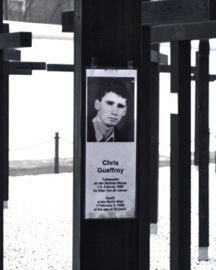No Bad Things
Artist: C-MACKENZIE
Curated by AMY SANDE-FRIEDMAN

C-MacKenzie, Pool Party 03, 2011
C-MacKenzie (Chris MacKenzie) removes the background imagery from his photographs, creating uncanny visions of people in surreal blank settings. Although his figures often assume the pose of spectators, they gaze upon nothingness. In creating these images, C-MacKenzie draws on his background in motion picture editing and post production, in which mistakes are removed from an image and figures are pasted to scenery. He envisions his artistic process as “withholding information” from the viewer. By negating the sense of place, C-MacKenzie creates an unknowable and mysterious world.
Nowhere Left to Look Away
1.
A video of a young woman stopping traffic and screaming at taxi cabs in the middle of a busy Manhattan street went viral a few weeks ago. Cell phone cameras recorded her yelling, “Sorry, I forgot you!” as she kicked at car doors that slowly passed around her. She’s fun to watch; pretty and sort of graceful, dancing around the cars as if she’s dodging waves on the beach. In her bleached blonde bob and skinny jeans, she takes breaks from her traffic dodging to strike pinup girl poses for the cell phone cameras. One of the top comments on YouTube read, “Either she’s a mental patient or a performance artist.”

The comment seems to imply that when someone is acting strangely in public, they are either extremely aware of themselves, resembling performers, or extremely unaware, consumed by the force of a breakdown. It’s easy to find examples of less appealing presentations of emotional breakdowns on YouTube, maybe even easier than it is to find recorded public displays of performance art. YouTube reframes private moments of suffering for public viewing, and performance art aims for something similar: it captures and examines live events we might otherwise look away from.
Issue 04 Launch Party
Celebrate the release of 04 with poetry editor John Hennessy, contributors, and special guests, including Richard Wilbur, the subject of Robert Bagg‘s “The Poet in Rome,” and South African literature expert Stephen Clingman, who will introduce the issue’s anthology of South African poetry. Held at Amherst Books in Amherst, MA
Their Names
By ROLF YNGVE

I told Christopher, the wall passed through here. We stood on the sidewalk and looked down at a plaque set into chic, new cobblestones.
Berliner Mauer 1961–1989.
Q&A with Robert Earle
S. TREMAINE NELSON interviews ROBERT EARLE

SN: Your short story “Doleo Ergo Sum,” which appears in Issue 4 of The Common, features several characters from The Brothers Karamazov. When did you first read Dostoevsky?
RE: I first read Dostoevsky when I was seventeen. Crime and Punishment was on my high school’s summer reading list. I’ve been reading him ever since. He was an extraordinarily complex literary genius, a man of great flaws, great faith, and great energy. When you go into his world, you’re there from the first page to the last.
SN: Would you consider your story historical fiction or an homage to Dostoevsky? Or perhaps literary fan-fiction?
RE: I think of everything I write as literary fiction, whether it has roots in historical events or literary phenomena. I use history extensively but don’t feel excessively tied down to it. For me, literature possesses its own reality, and that’s what literary-minded writers seek to explore. We don’t write “about” things; we use words and stories to create unique experiences for readers of our work.
Annals of Mobility: On the Forced Mobility of Exile
In New York City, where I live, thousands were displaced before and during Sandy: living in cramped quarters with friends or family, limited by downed transit and, in many cases, cut off from the instant, continual communications that we’ve all come to take for granted. Even so, there were, in my small world, such a wide range of experiences — from horrific to inconvenient to a nice break from normal obligations. For some, displacement and/or disconnection were traumatic; for others, they were a welcome disruption.
From the 17th Floor: All These Things So Arranged
Inside Orhan Pamuk’s Museum of Innocence and other Turkish wonders
Some places become museums because they’re ruins. Other museums are houses built to hold the relics.
In fifth century Constantinople, believers built a small Greek Orthodox chapel called The Church of the Holy Saviour in Chora. The Greek chora refers to the church’s place in the fields outside the city’s thick defensive walls. Rebuilt, restored, destroyed, and raised again over the centuries, the church became a truly glorified house of God in the fourteenth century under the stewardship of a powerful intellectual named Theodore Metochites, whose vision and funds decorated the interior with some of the finest mosaics and frescoes remaining from Byzantine times.
From the Stone House: Reading Stevie Smith in Milan
Beauty is overrated. Beauty is underrated.
Three months ago, shortly after moving to Italy for the year, I was walking along via Montenapoleone in Milan, gazing at lovely summer togs and shoes in the shops (beauty is overrated?), when I nearly stumbled into a bearded man wearing dirty shorts and old sneakers. He sat spread-legged on the sidewalk, an empty, leaning-Tower-of-Pisa paper cup between his knees. Not the right street for such begging, I found myself thinking—too upscale, everyone carrying credit cards rather than change. Nobody wanting to be bothered, what with the insufferable humidity and all the gorgeous distractions in the shop-windows.
Nothing But the Sea
I live a few blocks from a cruise ship terminal. When ships dock there, they tower above the nearby buildings, which top out at four or five stories high. At night, their decks and windows glitter in neat rows, like high-rise apartment buildings, as if downtown Manhattan has suddenly been pulled close. When the ships finally depart, their horns boom dramatically, out of place in my quiet, unassuming neighborhood of Red Hook, Brooklyn.


